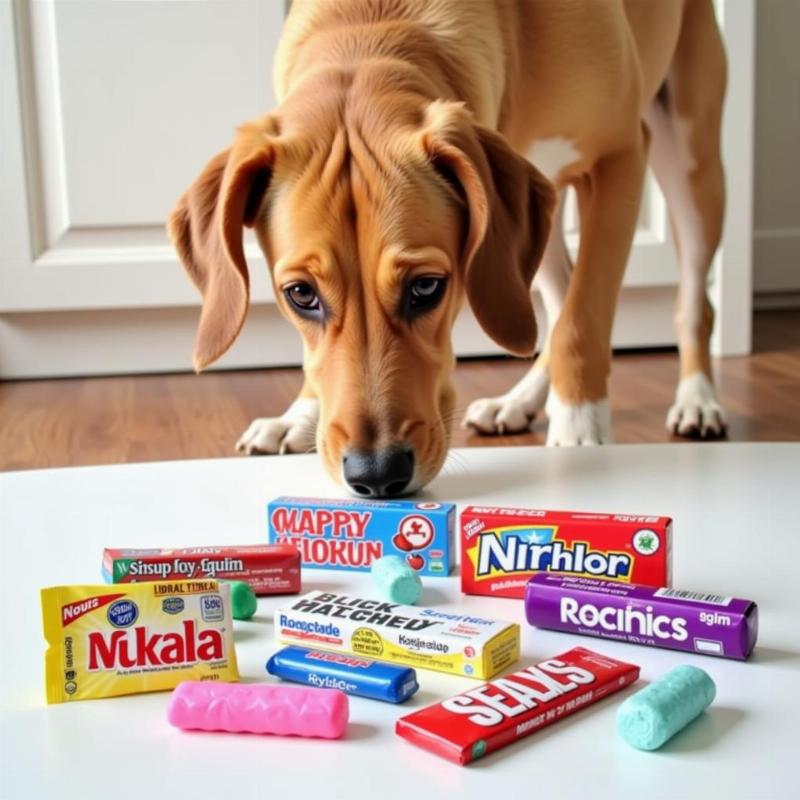Chewing gum is a common sight, often carelessly discarded on sidewalks. But what happens if your furry friend decides it’s a tasty treat? Can dogs die from eating gum? The simple answer is: it depends. While most gum itself isn’t deadly, the artificial sweetener xylitol, often found in sugar-free varieties, can be extremely toxic to dogs. Knowing the difference and acting quickly can save your dog’s life.
Understanding the Dangers of Xylitol in Gum
Xylitol is a sugar alcohol used as a sweetener in many sugar-free products, including gum. While harmless to humans, it triggers a rapid release of insulin in dogs, leading to a dangerous drop in blood sugar (hypoglycemia). This can manifest in weakness, vomiting, loss of coordination, seizures, and even liver failure in severe cases. The amount of xylitol needed to cause these effects varies depending on the dog’s size, but even small amounts can be harmful. If you suspect your dog has ingested gum containing xylitol, immediate veterinary attention is crucial.
 Xylitol Gum: A Danger for Dogs
Xylitol Gum: A Danger for Dogs
What to Do If Your Dog Eats Gum
If your dog eats gum, the first step is to identify the type of gum. Check the ingredients list for xylitol. If it contains xylitol, contact your veterinarian or an emergency animal hospital immediately. Time is of the essence in xylitol poisoning cases. Even if the gum doesn’t contain xylitol, it’s still not ideal for dogs to consume. The gum base can be difficult to digest and may cause gastrointestinal upset or blockages, especially in smaller breeds. Observe your dog for any signs of discomfort, vomiting, or changes in bowel movements.
Signs of Xylitol Poisoning in Dogs
Knowing the signs of xylitol poisoning can help you react quickly. Symptoms typically appear within 15-30 minutes of ingestion, but can be delayed up to 12 hours. Watch for:
- Vomiting
- Weakness or lethargy
- Loss of coordination
- Tremors or seizures
- Collapse
- Jaundice (yellowing of the gums and skin)
Preventing Xylitol Exposure
The best way to protect your dog from xylitol poisoning is prevention. Keep all xylitol-containing products, including gum, candies, baked goods, and even some peanut butters, out of reach. Educate your family members and guests about the dangers of xylitol for dogs. When walking your dog, be mindful of discarded gum on the ground. If you use xylitol-containing products yourself, be extra cautious about proper storage and disposal.
Is All Gum Bad for Dogs?
While xylitol is the primary concern, all gum is generally considered unsuitable for dogs. Even gum without xylitol can cause digestive problems due to its sticky consistency. It can stick to the teeth and contribute to dental issues. Furthermore, some gums contain other artificial sweeteners or flavorings that may not be well-tolerated by dogs.
Conclusion
While not all gum is deadly for dogs, the presence of xylitol makes it a serious threat. Knowing the risks, recognizing the symptoms of xylitol poisoning, and taking preventative measures are crucial for responsible dog ownership. If your dog ingests any gum, contacting your veterinarian is always the safest course of action.
FAQ
- What should I do if my dog ate a small piece of gum with xylitol? Contact your veterinarian immediately, even if your dog seems fine.
- How much xylitol is toxic to a dog? Even small amounts can be dangerous. The toxic dose varies depending on the dog’s size.
- Are there any safe alternatives to gum for dogs to chew on? Yes, there are many safe and appropriate chew toys designed specifically for dogs.
- How long does it take for xylitol poisoning symptoms to appear? Symptoms typically appear within 15-30 minutes, but can be delayed up to 12 hours.
- Can xylitol poisoning be treated? Yes, prompt veterinary treatment is crucial for a positive outcome.
- How can I prevent my dog from eating gum? Keep all gum and xylitol-containing products out of reach and be mindful of discarded gum on walks.
- What are the long-term effects of xylitol poisoning in dogs? Liver failure is a potential long-term consequence of xylitol poisoning.
Beautdogs.us is your premier destination for all things dog-related in the US. We offer expert advice on dog breeds, care, and lifestyle, providing reliable information for both new and experienced dog owners. Explore our comprehensive resources and connect with us for personalized guidance. Email: [email protected], Phone: +1 501-555-7529. Visit Beautdogs.us for all your dog care needs.